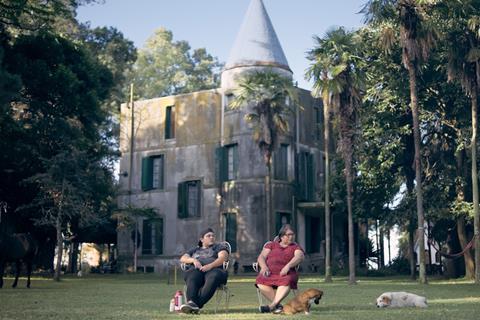A neglected castle in the Argentinian pampas is the setting for Martin Benchimol’s eccentric documentary

Dir: Martin Benchimol. Argentina/France. 2023. 78 mins.
Castles are built to be hard to enter, but there are some which are equally hard to escape. An offbeat, sombre documentary about a mother and daughter living a strange existence in a huge manor house in the Argentinian pampas, Martin Benchimol’s solo directorial debut The Castle is delightfully eccentric, teeming with ideas that are crying out to be further developed and bounced around. But despite the undeniable, Gothic power of some of its scenes and its wonderful, sad strangeness, ultimately it feels static and undercooked, failing to dramatically galvanise its intriguing premise and showing that even great ideas can’t stand alone. Following a Berlinale premiere in Panorama, limited festival exposure would seem to beckon for a film that represents something of a missed opportunity.
Delightfully eccentric, teeming with ideas that are crying out to be further developed and bounced around
Justina was formerly a servant in the large, eccentrically designed mansion. She has lived there since the age of five, but its socialite owner, whose photo hangs on the wall as a dark reminder of former glories, has now died. She has left Justina with a poisoned legacy – the cash-poor Justina gets to keep the property, but is not allowed to sell it. Justina shares the house with her daughter Alexia, who dreams of being a Formula 4 racing driver and who understandably feels that there must be more to life than living with your mum in a crumbling old house in the middle of nowhere.
Money is always tight. In a house which the animals have taken over – among the other occupants are a black lamb and a piglet, both shot from ground level and off the scale on the cute-ometer. Justina is occasionally obliged to sell a cow for slaughter. She does so reluctantly, not only because she is clearly an animal lover but because she doesn’t want to diminish the value of her inheritance.
Meanwhile, the lonely Justina conducts a phone relationship with a shadowy man, a lover perhaps, who keeps promising to visit but never does. At one point, much to Alexia’s annoyance, their peace is disturbed by a weekend visit from a group of partying relatives of the dead owner, who apparently turn up unannounced: though Justina doesn’t point it out to them, they no longer have any right to be there. Is Justina the owner, or still the servant? Even when one of the visitors quietly reminds her that, actually, she is free to sell up and move on, she refuses. Either way, Alexia, who supplies most of the comedy, isn’t prepared to live a life dictated by the strange terms of the Will of her mother’s former employer, and makes plans to leave.
Perhaps the most interesting thing about The Castle is Justina’s unfailing sense of duty to her former boss, even when there nothing good in it for her – as members of the failing aristocracy know all too well, there’s no point in inheriting the family pile if you can’t do anything except watch it slowly fall apart. It makes Justina a quietly compelling figure, one the one hand defiant and stubborn and, on the other, profoundly sad, a ghost in her own home.
Justina may of course be more than simply a symbol of enduring servitude but we never find out, because her inner life remains off limits to the viewer. Benchimol’s previous work, including The Dread (2017) and The People of the River (2012), both co-directed, delivered similarly offbeat tales from the Argentinian hinterlands, their stories enlivened by some remarkable interviewees. Here, though, the camera of Nico Miranda and Fernando Lorenzale is content merely to record events as they unfold, with no direct commentary. Any questions to the couple at the centre of the story would have surely felt like an intrusion, but their absence creates a flatness around the central character.
Outside the house, their camerawork configures the pampas as an area of forbiddingly vast, misty and rainy expanses, making everything look appropriately eerie; the house itself is gothic to the core. Jose Manuel Gatica’s distinctive, retro score is highly stylised orchestral fare with an edge of tango. Seeming to conflict with the prevailing downbeat tone, it has clearly been used ironically – but it’s unclear what point the irony wants to make, and it ends up merely distracting.
Production companies: Gema Films, Sister Productions
International sales: Luxbox fiorella@luxboxfilms.com
Producers: Mayra Bottero, Gema Juarez Allen, Clarisa Oliveri
Screenplay: Martin Benchimol
Cinematography: Nico Miranda, Fernando Lorenzale
Editing: Ana Remon
Music: Jose Manuel Gatica
























